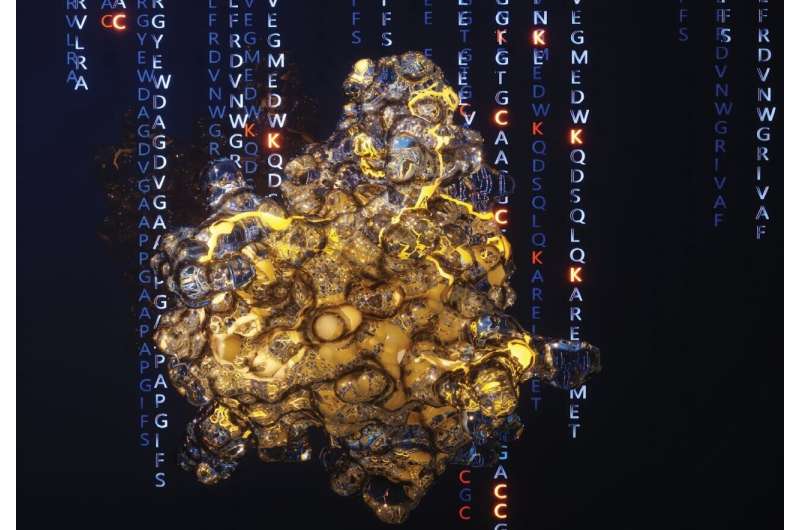
In a research published in Nature Nanotechnology, scientists from Delft College of Technology current a brand new approach to establish proteins. Proteins perform important capabilities in our cells, whereas taking part in a vital function in illnesses like most cancers and COVID-19 an infection. The researchers establish proteins by studying out the fingerprint, and evaluating the fingerprint to patterns from a database.
Utilizing this new expertise, the researchers can establish particular person, intact, full-length proteins, preserving all its info. This could make clear the mechanisms behind many alternative illnesses and permits earlier prognosis.
Incomplete IKEA venture
“The research of proteins inside cells has been a sizzling subject for many years, and has made enormous developments, permitting researchers to get a a lot better thought on what sort of proteins there are, and what operate they perform,” says Mike Filius, first writer of the paper.
At present, scientists use a way referred to as mass spectrometry to establish proteins. The commonest mass spectrometry method is the “bottom-up” method, through which full-length proteins are lower into smaller fragments, referred to as peptides, that are then measured by the mass spectrometer. Primarily based on the info from these small fragments, a pc reconstructs the protein.
Filius says, “This can be a bit just like your typical IKEA venture, the place you are all the time left with some spare elements you are probably not positive how to slot in. However within the case of proteins, these spare elements may very well comprise very priceless info, for instance about whether or not or not such a protein has a dangerous construction that causes a disease.”
The protein fingerprint
“With a purpose to establish a protein, you needn’t know the entire amino acids; the constructing blocks of any protein. As an alternative, you attempt to get hold of adequate info with the intention to establish the protein utilizing a database as reference, just like how the police might discover a suspect’s id by way of a fingerprint,” Filius explains.
“In earlier work, we have now proven that each protein has a singular fingerprint, identical to the human analog. We realized that we solely must know the situation of some out of all of the amino acids of a protein to generate a singular fingerprint from which we will establish the protein,” provides Raman van Wee, a Ph.D. candidate who was concerned within the analysis.
Discovering proteins in a haystack
“We are able to detect these amino acids by way of molecules that gentle up below a microscope and are connected to small items of DNA that bind very particularly to a sure amino acid,” Van Wee explains. This manner, the staff can in a short time decide the situation of the amino acid with nice precision.
“Because the sensitivity of this new approach, referred to as FRET X, is greater than that of typical strategies like mass spectrometry, we will detect a lot decrease concentrations of proteins in a mix of many different biomolecules and require solely a tiny quantity of pattern,” Filius says. That is vital, as a result of that places the measurement of affected person samples in case of illness inside attain.
“In our paper we present that we will detect small quantities of proteins which might be attribute of Parkinson’s illness, or of COVID-19 an infection,” Filius says.
“Whereas there are different approaches being explored to establish proteins, ours focuses on figuring out intact and particular person proteins in a posh combination. We are able to search for a needle in a haystack,” provides Van Wee.
Towards early-stage illness prognosis
Although promising, the analysis requires substantial improvement nonetheless, which the Chirlmin Joo Lab is trying ahead to work on. The analysis group has talked with a number of stakeholders in scientific labs and the biopharmaceutical business and realized that they’re actually excited in regards to the groundbreaking potential that the expertise has.
They’re additionally engaged on launching a start-up to develop FRET X right into a platform for extremely delicate protein detection. This platform can diagnose illnesses on the earliest phases, enhancing the efficacy of potential therapy.
“This breakthrough approach cracks the code of proteins and opens up thrilling prospects for earlier illness detection,” says Chirlmin Joo, supervisor of the venture.
Extra info:
Mike Filius et al, Full-length single-molecule protein fingerprinting, Nature Nanotechnology (2024). DOI: 10.1038/s41565-023-01598-7
Offered by
Delft University of Technology
Quotation:
Scientists develop new expertise to establish particular person full-length human proteins (2024, February 15)
retrieved 16 February 2024
from https://phys.org/information/2024-02-scientists-technology-individual-full-length.html
This doc is topic to copyright. Aside from any truthful dealing for the aim of personal research or analysis, no
half could also be reproduced with out the written permission. The content material is supplied for info functions solely.







